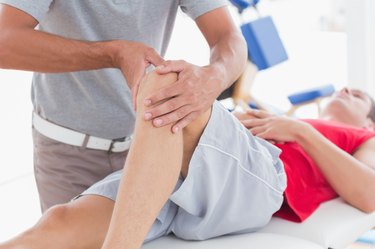
Inversion tables decrease spine pressure, which can benefit the typical user. But they pose health risks for individuals with total knee replacements. These risks are greater than any potential benefit. Although you may not be able to use a traditional inversion table, alternate spinal decompression therapies are available for back pain relief.
Decreased Blood Flow
Video of the Day
Because inversion tables decrease the blood supply to the legs, even for a short period of time, you are at a greater risk for having blood clot which is a major health complication. You should especially be cautious if your doctor prescribes blood thinners after knee replacement since an inversion of 90 degrees significantly increases risk of complications.
Video of the Day
Excessive Strain
Although knee replacement surgery results in overall greater mobility for most people, you will not have the same range of motion in your knees that you did with the original joint. The American Academy of Orthopaedic Surgeons indicates that while you can resume many of your normal activities, your artificial knee does not have the same capabilities of the original joint. The knee implant is slightly weaker and cannot stand up to the same strains and pressure that you might have experienced with your healthy knee joints. Certain activities and even positions such as kneeling put greater strain on the knee and should be minimized to avoid any damage. Because inversion tables may put pressure on muscles and ligaments in the knee area, the American Academy of Orthopaedic Surgeons recommends avoiding inversion tables after this procedure.
Pain and Discomfort
In addition to serious health risks, inversion tables place strain on the knees and ankles which can be very painful. You may experience greater pain and discomfort that lasts for days after using an inversion table. Additionally, this pain indicates that the knee area is being stressed and may potentially cause complications with the replacement knees. Because of the angle and the pull of gravity, inversion tables do more harm than good after total knee replacement.
Inversion Chairs Possible
Inversion chairs offer a similar benefit to tables with a greatly decreased risk of injury. The inversion angle in the chairs is much less severe and decreases the pressure on the knee joints. However, inversion chairs may still not be safe for every person to use. Discuss the possibility of using an inversion chair with your doctor or orthopedic surgeon to determine if it's appropriate for you.
Is this an emergency? If you are experiencing serious medical symptoms, please see the National Library of Medicine’s list of signs you need emergency medical attention or call 911.